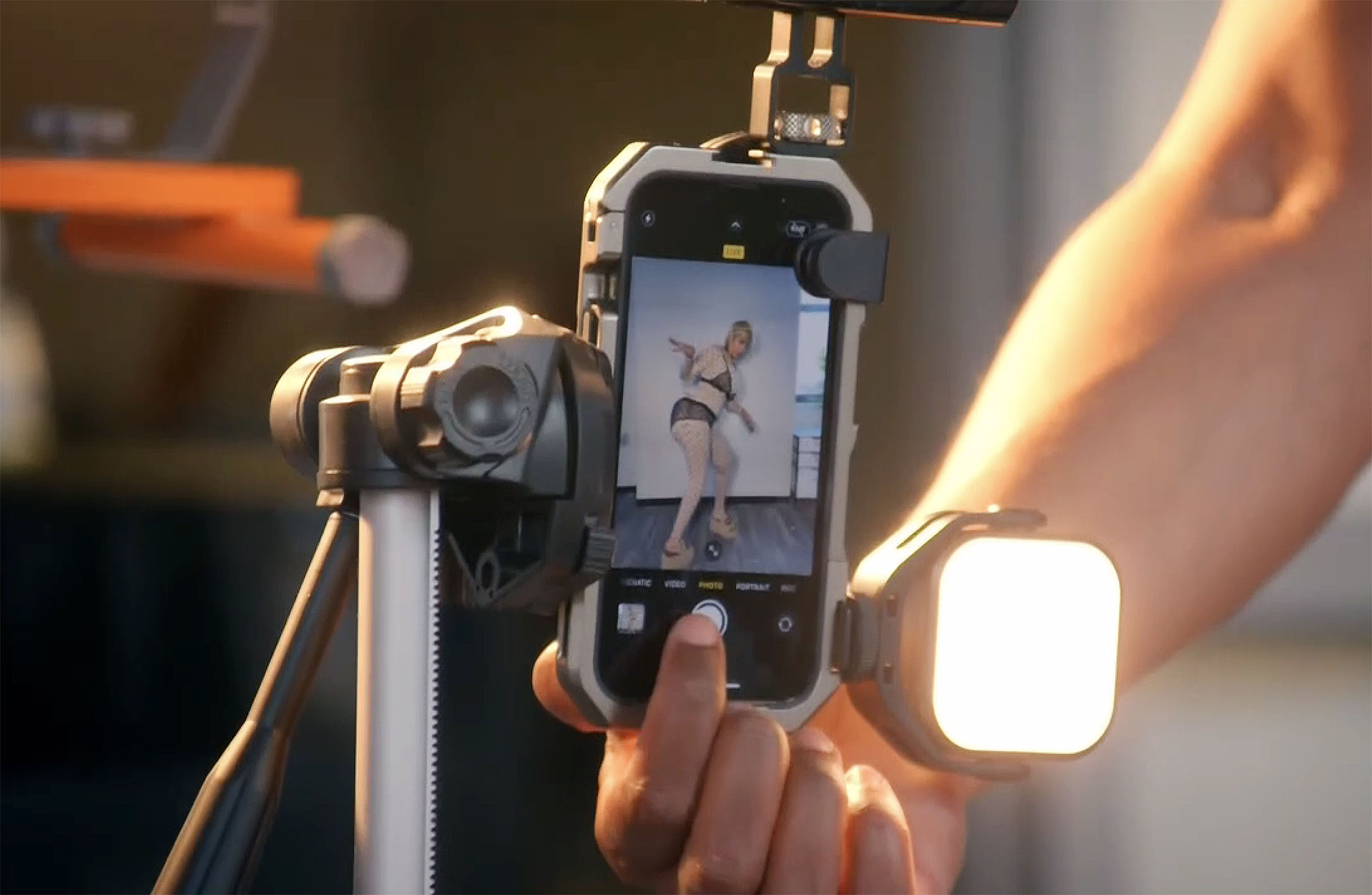
We’re only into the second hour of The Exhibit, MTV’s new art-world reality competition series, and… is anyone getting negative vibes? Jennifer Warren, who won last week’s challenge, certainly is. Walking into the Hirshhorn Artist Studio, she picks up on an icy atmosphere she interprets as competitive jealousy from her peers. Which, sure—there’s only $100,000 and a solo exhibition at the Hirshhorn at stake, after all.
“If I win, I earned it,” Warren insisted. “I don’t feel intimidated anymore.”
With that bit of ginned-up drama out of the way, there’s now art to make and the next great artist to uncover. This week’s episode goes right into the commissions, asking the contestants to create work around the theme of social media. In line with the immediacy of the subject, they’re only given seven hours to complete their pieces.
Clare Kambhu putting together her commission in The Exhibit. Photo: Screenshot from The Exhibit, episode two.
But they have a rich enough field to mine. Social networks, while easing connections, have proven damaging to users’ senses of self and reality, if not the political and social fabric. “Social media sucks in a lot of ways, but it’s given voice to people who are oppressed,” Jillian Mayer said. “It’s not really about [its] pros and cons, but about an intertwined experience.”
JiaJia Fei, digital strategist and this week’s guest judge, also surfaced how social media has given us “unprecedented access to images,” becoming a channel through which a lot of art is now platformed and discovered, bought and sold.
Frank Buffalo Hyde painting his commission on The Exhibit. Photo: Screenshot from The Exhibit, episode two.
The artists pick up on these tensions. Clare Kambhu’s piece encompasses both a painting and an installation of old smartphones displaying the same painting, as a way to contrast the IRL vs. on-screen experience of art. Warren’s trio of paintings mimics an Instagram profile, and Jamaal Barber’s linocuts the infinite scroll. Frank Buffalo Hyde’s own canvas, depicting an Indigenous Buffalo Dance on the screen of a smartphone, reflects on the digitally mediated existence.
Then there are our enfants terribles. Mayer is crafting one of her Slumpie sculptures, interactive resin and silicone constructions for what she calls the “post-posture human form.” In short, they’re sculptures for individuals to lean on or lie in as they use their Apple products, thus allowing “participants to engage with art while on their phone.”
Misha Kahn, in another gimmicky move, is sculpting a conveyor belt out of trash meant to send handmade smartphones, also made out of trash, into a hole in the wall, “which is what happens with everything we put online.” No points for guessing how he feels about social media.
Baseera Khan sewing the “augmented bust” for their commission in The Exhibit. Photo: Screenshot from The Exhibit, episode two.
But it’s Baseera Khan who pulls focus with their effort to recreate the statues of multi-limbed Indian deities such as Shiva with their “face, tits, and ass selfie.”
It’s a project that folds in sculpture, performance, photography, and collage: Khan first crafts their fake “tits” and “ass” out of padded material, before putting them on themself, atop an outfit of “couture underwear,” and snapping (or asking Barber to snap) photos of themself striking exaggerated poses. Once printed, the images are conjoined to form a massive collage complete with a three-dimensional S-curve.
As the competitors work against a time crunch, series judge Melissa Chiu makes her rounds and in her Maude Lebowski way, offers art-appropriate parlance for what is happening: Kambhu’s wall of obsolete smartphones is “trompe-l’œil,” Khan’s augmented breasts are “armature.” (When handed the fake bust—I mean, armature—and asked by Khan to try it on, Chiu, in one of the show’s rare comic moments, considers it for a second before nervously passing the object back to the artist.)
Jillian Mayer, Slumpie 143 (2023). Photo: Screenshot from The Exhibit, episode two.
At crit, Chiu, Fei, and Samuel Hoi, president of the Maryland Institute College of Art, bestow props on Buffalo Hyde for a “beautiful painting that looks like art,” Mayer’s sculpture that’s “super cool,” and Kahn’s trash installation for its “odd sense of humor, absurdity, and play.” Barber’s linocuts and Warren’s paintings, though, fail to gain favors.
No surprises: Khan’s work, Haute Couture, triumphs. Extra credit for their installing the piece with a fan, causing elements of the collage to flutter and affording the entire piece a kineticism not unlike that of a GIF. The judges further applauded the artwork’s complexity—digging as it does into influencer culture, self-presentation, and the objectification of women, while containing, in Hoi’s words, “defiance, protest, and humor.”
Baseera Khan, Haute Couture (2023). Photo: Screenshot from The Exhibit, episode two.
Cut to Khan’s gleeful declaration: “I won, bitches!”
Host Dometi Pongo then decides he wants a selfie with Mayer’s Slumpie 143, because, of course. A group shot is then orchestrated, which looks about as awkward as you’d expect.